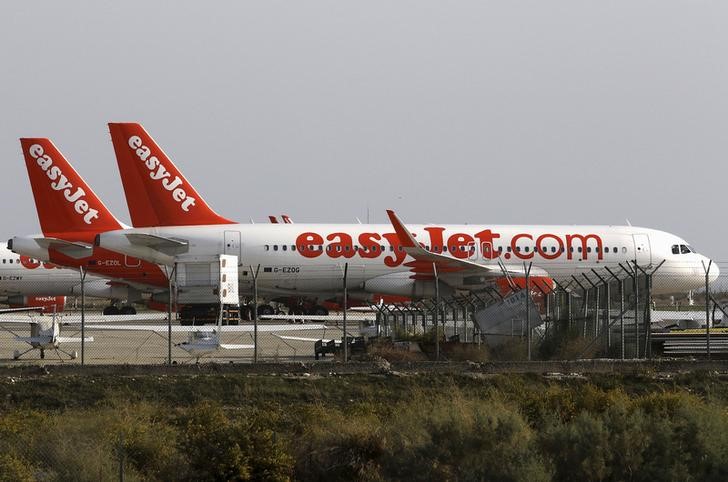By Victoria Bryan
LONDON (Reuters) - Airline stocks plunged on Friday and IAG (L:ICAG) said it would no longer meet its profit targets this year after Britain's vote to leave the EU raised concerns over travel demand and flying rights.
Airlines with a strong focus on the UK market were worst hit, with IAG, easyJet (L:EZJ), Wizz Air (L:WIZZ) and Ryanair (I:RYA) all down by 18-22 percent. British bank HSBC (L:HSBA) downgraded all European carriers to "reduce".
Ahead of the vote, airline bosses had warned that a so-called Brexit could lead to a slide in demand for leisure and business travel, though analysts say that a fall in the pound could make leisure travel to the UK more attractive.
IAG said on Friday that, while it does not expect the Brexit vote to have a long-term material impact on its business, profit will take a hit in the short term.
"Following the outcome of the referendum, and given current market volatility, while IAG continues to expect a significant increase in operating profit this year it no longer expects to generate an absolute operating profit increase similar to 2015," the company said in a statement.
FLYING RIGHTS
A Brexit could also lead to detrimental changes to airlines' flying rights. As an EU member state, Britain is currently part of the EU's single aviation market, which allows airlines to fly freely to and within member states.
While the UK government is expected to seek to rejoin the single aviation market, there is no certainty this will be achieved.
HSBC said that if Britain did not rejoin the single aviation market 30 percent of easyJet's operation could be affected, or 40 percent if its Swiss air operators certificate (AOC) is also called into question. The bank said that about 30 percent of Ryanair's operations could be hit and 25 percent at Wizz Air.
Brokerage Concorde puts easyJet's exposure at 45 percent, IAG at 35 percent, Ryanair at 27 percent (excluding Ireland) and Wizz Air at 15 percent.
To get around any restrictions, easyJet could seek an EU-based AOC for its continental European operations, while Ryanair and Wizz could set up a UK-based AOC.
"Implementing new corporate structures would add overhead costs and reduce operational flexibility," HSBC analysts said.
CONSIDERING OPTIONS
EasyJet said it is working on a number of options to allow it to continue flying in all of its markets and has already written to the UK government and European Commission to urge them to ensure Britain stayed in the single aviation market.
"We remain confident in the strength of easyJet’s business model and our ability to continue to deliver our successful strategy and our leading returns," CEO Carolyn McCall said in a statement.
Eastern European carrier Wizz Air could also suffer from reduced demand from Polish and Hungarian workers flying to and from the UK, said Daniel Tunkli, airline sector analyst at Concorde Securities in Budapest.
"That market is now under serious risk, but what precise implications it might have remains to be seen. I doubt the UK will now send guest workers home, but if they begin to require visas and generally just make air travel more cumbersome, that will hurt Wizz Air," he said.
Lufthansa (DE:LHAG) Chief Executive Carsten Spohr said that he considers the impact of Brexit on the German carrier's business as "manageable" because Britain accounts for only 5 percent of group revenue.
